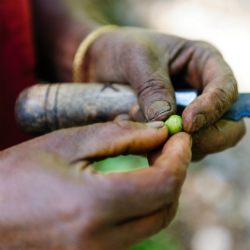Answer these simple questions and we will find you the BEST prices
Which type of solar quotes do you need?
It only takes 30 seconds
100% free with no obligation

Get up to 4 quotes from our selected suppliers by filling in only 1 form

Save money by comparing quotes and choosing the most competitive offer

Our service is 100% free and with no obligation
- Market-Inspector.co.uk
- Blog
- Coffee and CSR: A Brewing Topic
Coffee and CSR: A Brewing Topic
Corporate Social Responsibility (CSR) is constantly evolving and now more and more coffee companies are taking it on board to gain a competitive advantage. It’s not a question of whether CSR should be implemented, but rather, how to implement it.
Companies now want to assume responsibility for the origin of their coffee, but this is of course within the confines of economic reality and commercial feasibility. Furthermore, developing countries which grow coffee can lack good governance and there are no legal frameworks to protect labour rights and assure environmental care.
Protective organizations are inefficient and unions cannot stand up for living wages. Hence, CSR concepts can help create better trading conditions. You can also find your perfect coffee machine rental solutions.
Economic Implications
So why is strengthening CSR so important within the coffee industry? It is important when you consider the fact that coffee farmers were paid about a quarter of the production price for their coffee, leading to financial debt, poverty, and sometimes starvation. Like most other commodities, coffee is being overproduced causing prices to rise and fall in turn.
Previously, coffee prices were kept steady by the International Coffee Agreements, in that a target price was set, and export quotes grew according to increase of coffee price. Disagreements between member countries eventually led to the demise of the quota system due to the rise of free-trade. This deregulation meant that farmers could not make decisions about their own situation.

The United Nations World Food Programme estimated the “coffee crisis” to have caused famine for around 30,000 people in Honduras alone. Furthermore, one in eight children were starving in the coffee areas of Nicaragua due to low coffee prices. Many organizations such as Oxfam and FairTrade also recognise how the steep drop in coffee prices pushes people into poverty across the globe.
Furthermore, the drop in prices means that farmers enter themselves into a “debt trap.” When farmers are unable to pay their debt, they work as a type of slave in order to pay off excess charges. This affects the economies of entire countries like Honduras, Ethiopia, and Burundi due to their reliance on the income generated by coffee exports-- this can be up to 54% or 79% of their total income.
Coffee producers can attain a higher price for their coffee by increasing the quality of the beans, and by appealing to organic coffee suppliers or fairtrade. Consumers can also do their part by making ethical choices to achieve a sustainable society.
This, however, is not as easy as it seems, most times, some companies who espouse CSR goals are quite disingenuous and consumers are largely driven by many other factors other than social and environmental concerns. Even if consumers wish to make the right choices, labelling is quite a confusing thing to navigate.
What can you do?

If you wish to find chemical free coffee alternatives, you can buy traditional coffee from Yemen and almost all of Ethiopia. Also, most Sumatra Mandheling coffee farms are among the world’s finest.
However, if you don’t have access to these interesting locations, you can opt for certified organic coffee.
This means that you are buying coffee which has been monitored by independent agencies and found to be free of pesticides, herbicides, fungicides, chemical fertilizers, and other potentially harmful chemicals.
These agencies monitor the growing process and verify that no chemicals have been used during the every step of the process. However, implementing independent agencies is costly, which is why certified coffees are more expensive than non-certified coffees.
Environmental and Health Implications
Buying sustainable coffee is a positive step, but consumers should be aware that “sustainable” labelling is a rather loose term, which doesn’t necessarily guarantee that farmers are avoiding chemicals in their coffee farming. Coffee farms that use harmful chemicals like pesticides contribute to the destruction of the environment and threaten the health of the rural poor who raise coffee.
However, research on pesticide handling practices have been scarce, but one study shows that the majority of farmers in Jamaica reportedly suffered from at least one health symptom associated with pesticide handling. Coffee production is an important economic activity in Jamaica, and more than 50,000 people are employed in the coffee business, contributing to 7% of the island’s agricultural earnings.
Recycling Efforts
A lot of companies like Nespresso have decided to change tactics to support green strategies and CSR. Nespresso is now recycling it’s aluminium capsules made for their espresso coffee machines. Now, several countries have the opportunity to recycle Nespresso’s capsules, and customers around the globe can take the capsules back to Nespresso’s stores.
Alternatively, the capsules can be picked up from the customer's home (when a new batch of capsules are being delivered). Nespresso has also introduced the Pixie coffee machine that is made of 98% of recycled aluminium, and they have also decided to recycle their coffee ground into fertilizer.

Despite these positive contributions, some argue that Nespresso is only a small part of Nestle, which is criticised for not creating other sustainability projects and relying solely on Nespresso CSR endeavours.
Long Term Effort
CSR requires a long term commitment, but slowly but surely, it is becoming more instilled into company practice. This is especially because more companies are realising that consumers respond well to socially responsible endeavours.
Not to mention, financial markets respect companies who respect human rights and sustainable goals because their risk profile is lowered. Furthermore, non-governmental organizations are expecting serious and concrete steps from coffee companies to do their part in improving coffee projects that reduce poverty.
With this continued pressure, large coffee companies are improving coffee and paying higher prices for certified coffee. Smaller producers, on the other hand have the large project of becoming a reliable trading partner for commercial buyers.
We strive to connect our customers with the right product and supplier. Would you like to be part of Market Inspector?

